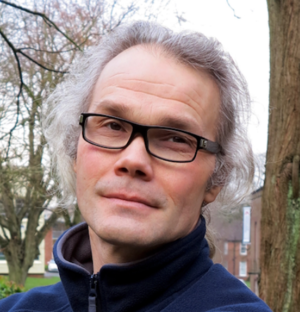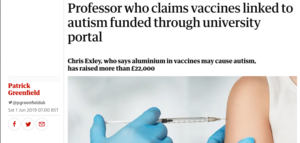Difference between revisions of "Chris Exley"
(start) |
(add substack) |
||
| (One intermediate revision by the same user not shown) | |||
| Line 3: | Line 3: | ||
|constitutes=chemist | |constitutes=chemist | ||
|image=Chris Exley.png | |image=Chris Exley.png | ||
| − | |interests=aluminium,vaccines,Alzheimer’s disease | + | |interests=aluminium,vaccines,Alzheimer’s disease,adjuvants |
|nationality=UK | |nationality=UK | ||
| + | |substack=https://drchristopherexley.substack.com/ | ||
|birth_date= | |birth_date= | ||
|birth_place= | |birth_place= | ||
|death_date= | |death_date= | ||
|death_place= | |death_place= | ||
| − | |description= | + | |description=Researcher into aluminium toxicity and [[vaccines]] who was pressured to quit from [[Keele University]] after pressure from big donors. |
|parents= | |parents= | ||
|spouses= | |spouses= | ||
| − | | | + | |website=https://www.aluminiumresearchgroup.com/ |
|relatives= | |relatives= | ||
|alma_mater=University of Stirling | |alma_mater=University of Stirling | ||
| Line 21: | Line 22: | ||
|end=2021 | |end=2021 | ||
|employer=Keele University | |employer=Keele University | ||
| − | |description=Pressured out by | + | |description=Pressured out by university management because of his research into the toxicity of aluminium |
}} | }} | ||
}} | }} | ||
'''Christopher Exley''' is an English chemist known for his research on the health effects of [[aluminium]] exposure. | '''Christopher Exley''' is an English chemist known for his research on the health effects of [[aluminium]] exposure. | ||
| − | He was a tenured professor at [[Keele University]] for nearly 30 years, before he was pressured out in 2021. Exley and his team of research scientists had in [[2017]] established what he describes as an "unequivocal" connection between [[aluminium toxicity]] and[[Alzheimer’s disease]]. | + | He was a tenured professor at [[Keele University]] for nearly 30 years, before he was pressured out in 2021. Exley and his team of research scientists had in [[2017]] established what he describes as an "unequivocal" connection between [[aluminium toxicity]] and [[Alzheimer’s disease]]. |
| + | |||
| + | |||
| + | {{SMWQ | ||
| + | |subjects=aluminium,Alzheimer’s disease,autism,multiple sclerosis,adjuvants | ||
| + | |text=We have confirmed previous conclusions that the aluminium content of brain tissue in Alzheimer’s disease, autism spectrum disorder and multiple sclerosis is significantly elevated. | ||
| + | |date= | ||
| + | |authors=Chris Exley | ||
| + | |source_URL=https://childrenshealthdefense.eu/public-health/prof-chris-exley-victim-of-scientific-assassination-says-outraged-french-medical-journalist/ | ||
| + | }} | ||
==Education== | ==Education== | ||
| Line 32: | Line 42: | ||
==Career== | ==Career== | ||
| − | + | [[image:Chris Exley Guardian.png|thumb|left|As part of a string of negative stories in [[corporate media]], in [[2019]], the Guardian published an hit piece on his funding via Keele’s online funding portal and drawing attention to his work on aluminium in vaccines and their potential link to autism.<ref>https://www.theguardian.com/society/2019/jun/01/professor-who-links-vaccines-to-autism-funded-through-university-portal</ref>]] | |
| + | From 1984 until [[2021]], when he chose to resign after years of harassment from management<ref>https://www.aluminiumresearchgroup.com/history</ref>, he was Professor of Bioinorganic Chemistry and group leader of the Bioinorganic Chemistry Laboratory at [[Keele University]]. He is also an honorary professor at the [[UHI Millennium Institute]].<ref>https://www.keele.ac.uk/lifesci/ourpeople/chrisexley/</ref><ref>https://www.keele.ac.uk/aluminium/groupmembers/chrisexley/</ref> | ||
| + | |||
| + | The team had developed a protocol to measure the aluminium content of [[brains]], which had shown that the brains of people with Alzheimer’s, [[autism]] and [[multiple sclerosis]] had elevated levels of aluminium. The focus of their research had begun to turn to [[adjuvants|aluminium adjuvants]] and [[vaccines]].<ref name=looking/> | ||
| + | |||
| + | In the modern world, everybody in the world ingest aluminium through [[processed foods]], drink it in [[water]], cook in aluminium pots and pans. It is found in [[baby formula]], [[cosmetics]] and is a key ingredient in many [[vaccines]].<ref name=looking>https://www.thelookingglass.co.nz/how-a-university-its-major-funders-and-a-newspaper-killed-research-into-the-toxicity-of-aluminium-adjuvants-in-vaccines/</ref> | ||
| + | Exley had been very successful at attracting independent and unsolicited funding for his research from traditional sources as well as from the public and [[philanthropists]]. He had brought in about £6 million over his 30 year term at Keele, most of it from traditional funders (corporate, government and large charities). From the 1990s onwards, his research group experienced increasingly difficulties to obtain funding to do research into aluminium toxicity. In [[2016]] the university set up a simplified portal for Exley’s team to receive donations, which he says worked well for a couple of years. But in [[2018]], senior management began to interfere. He began to receive emails from potential donors that the portal was not working, and found out that it had been disabled. <ref name=looking/> | ||
| + | "Since 2016", when ''[[Nature]]'' published on of his studies on toxicity of aluminium adjuvants in clinically approved vaccines, "I have only received negative publicity about our research. This was not always the case."<ref name=looking/> | ||
{{SMWDocs}} | {{SMWDocs}} | ||
==References== | ==References== | ||
{{reflist}} | {{reflist}} | ||
Latest revision as of 02:47, 8 June 2023
(chemist) | ||||||||||||||||
|---|---|---|---|---|---|---|---|---|---|---|---|---|---|---|---|---|
 | ||||||||||||||||
| Nationality | UK | |||||||||||||||
| Alma mater | University of Stirling | |||||||||||||||
| Interests | • aluminium • vaccines • Alzheimer’s disease • adjuvants | |||||||||||||||
Researcher into aluminium toxicity and vaccines who was pressured to quit from Keele University after pressure from big donors.
| ||||||||||||||||
Christopher Exley is an English chemist known for his research on the health effects of aluminium exposure.
He was a tenured professor at Keele University for nearly 30 years, before he was pressured out in 2021. Exley and his team of research scientists had in 2017 established what he describes as an "unequivocal" connection between aluminium toxicity and Alzheimer’s disease.
“We have confirmed previous conclusions that the aluminium content of brain tissue in Alzheimer’s disease, autism spectrum disorder and multiple sclerosis is significantly elevated.”
Chris Exley [1]
Education
Exley is a Biologist with a PhD in the ecotoxicology of aluminium from the University of Stirling.[2]
Career

From 1984 until 2021, when he chose to resign after years of harassment from management[4], he was Professor of Bioinorganic Chemistry and group leader of the Bioinorganic Chemistry Laboratory at Keele University. He is also an honorary professor at the UHI Millennium Institute.[5][6]
The team had developed a protocol to measure the aluminium content of brains, which had shown that the brains of people with Alzheimer’s, autism and multiple sclerosis had elevated levels of aluminium. The focus of their research had begun to turn to aluminium adjuvants and vaccines.[7]
In the modern world, everybody in the world ingest aluminium through processed foods, drink it in water, cook in aluminium pots and pans. It is found in baby formula, cosmetics and is a key ingredient in many vaccines.[7]
Exley had been very successful at attracting independent and unsolicited funding for his research from traditional sources as well as from the public and philanthropists. He had brought in about £6 million over his 30 year term at Keele, most of it from traditional funders (corporate, government and large charities). From the 1990s onwards, his research group experienced increasingly difficulties to obtain funding to do research into aluminium toxicity. In 2016 the university set up a simplified portal for Exley’s team to receive donations, which he says worked well for a couple of years. But in 2018, senior management began to interfere. He began to receive emails from potential donors that the portal was not working, and found out that it had been disabled. [7]
"Since 2016", when Nature published on of his studies on toxicity of aluminium adjuvants in clinically approved vaccines, "I have only received negative publicity about our research. This was not always the case."[7]
References
- ↑ https://childrenshealthdefense.eu/public-health/prof-chris-exley-victim-of-scientific-assassination-says-outraged-french-medical-journalist/
- ↑ https://web.archive.org/web/20181102183025/https://www.keele.ac.uk/aluminium/groupmembers/chrisexley/
- ↑ https://www.theguardian.com/society/2019/jun/01/professor-who-links-vaccines-to-autism-funded-through-university-portal
- ↑ https://www.aluminiumresearchgroup.com/history
- ↑ https://www.keele.ac.uk/lifesci/ourpeople/chrisexley/
- ↑ https://www.keele.ac.uk/aluminium/groupmembers/chrisexley/
- ↑ a b c d https://www.thelookingglass.co.nz/how-a-university-its-major-funders-and-a-newspaper-killed-research-into-the-toxicity-of-aluminium-adjuvants-in-vaccines/